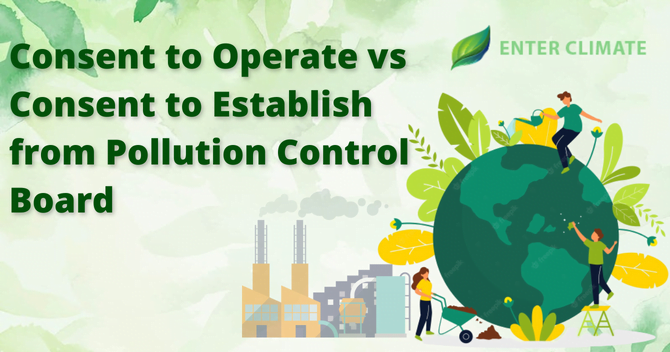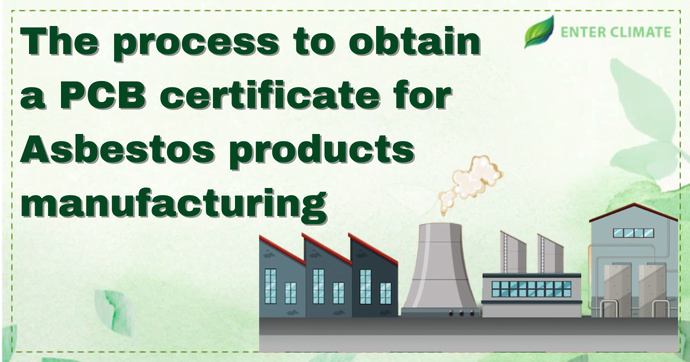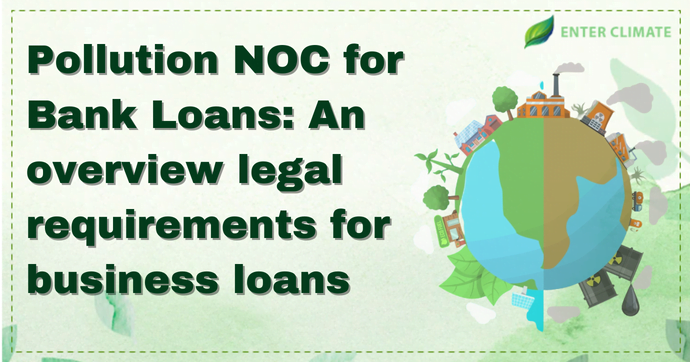Consent to Operate vs Consent to Establish from Pollution Control Board
 02 Sep, 2022
02 Sep, 2022 
The development of a country is judged through its industrial market. More industries directly indicate the high GDP of the country. But, due to this many times, the environment of the country is compromised, resulting in an increase in pollution and health hazards. Hence, to regulate the working of Industries and maintain a sustainable environment Certificate of consent were introduced under Air and Waste Act. Here’s a detailed article on Consent to Operate (CTO) vs Consent to Establish (CTE).
Categories of Industries classified by Pollution Control Board
The different types of categories of industries identified by Pollution Control Boards are:-
White Category- Industries having the minimum measurement of the Pollution Index is up to 20. The industries included are not required to acquire Consent to Operate. Simply informing the State Pollution Control Board or Pollution Control Committee is enough.
Green Category-The Green category consists of industries with a pollution index of 21 -40.
Orange Category-Orange Category of Industries has a higher pollution index between 41 and 59, like lime manufacturing units, glass-making industries, pharmaceutical formulation, etc.
Red Category- Industries that are producing maximum pollution with the highest pollution Index score of 60 and above are categorized under the Red category. Red category industries are disqualified from any ecologically fragile area/protected area.
Process of acquiring Registration for CTO vs CTE
While understanding the registration process for Certificate to Operate vs Certificate to Establish, it is to be kept in mind that the manufacturers, as per guidelines, should obtain the required Air and water Consent to establish as the primary step into establishing the industry or operating units.
Consent to Establish
- The manufacturer, while applying for Consent to Establish, requires registering through the Online Consent Management and Monitoring System (OCMMS) of the concerned State Pollution Control Boards.
- The application to be uploaded should have all the mandatory info along with the documents required to be enclosed with the application.
. - This is followed by a mandatory inspection of the unit by the official personnel of the State Pollution Control Board/Pollution Control Committee.
- After the assessment of the manufacturing unit and authorization of the respective committee, the decision for authorisation is taken.
- Further, under the process of describing Consent To Operate v/s Consent To Establish, if the producers or manufacturers cannot establish the industry within the obligatory time, the manufacturer is instructed to register for the leeway of the certificate one month after the expiration of the certificate. The certificate will be delivered after the authorised officer has finished his inspection.
Documents/Certificatenecessary for Consent to Establish
1. SSI Certificate of Partners/Directors, Industry Department Certificate
2. Site plan/The layout plan displays the drainage/pipeline and final dumping point for liquid effluent.
3. Collection, storage, and disposal of solid waste
4. Total open land in the industrial complex for Green Belt Development, landscaping, and other purposes.
5. A qualified person drew building blueprints with machinery details
6. Site plan with photos depicting the distance between the proposed site and the nearest residential area and water body (applicable for Orange and Red categories).
7. Total constructed area
8. The project report includes production process information, process flow diagram, chemical formulas, emission, effluent, and hazards/solid waste sources.
9. Water usage breakdown and water balance
10. DG specifications
11. Raw material list with daily MTD/monthly quantity
12. Effluent / Sewage Treatment Plant Specifications and Flow Diagram
13. Boiler type, fuel used, and quantity
14. Specifics on air pollution controls
15. Product/by-product list with daily MTD/monthly quantity
16. Permission from the state’s groundwater authority
17. Common Biomedical Waste Treatment Facility Membership Letter (for healthcare facilities, Pharmaceutical units)
18. In the case of chemical industries, a Material Safety Data Sheet is required
Consent to Operate
While understanding Consent To Operate v/s Consent To Establish, it may be noted that Consent to Operate is needed by the manufacturers when the industry is established and is ready to operate, as per the stipulated norms under the Water Act and the Air Act.
- The required application form on the concerned State Pollution Control Board’s official site must be filled out and uploaded per the stipulated guidelines.
- After the application is completed, the application, along with the documents requested and fees, is to be uploaded to the site.
- Once the application with required authorisations and fees is uploaded, it is sent to the authorised personnel for review. Next comes the personal inspection and preparation of a detailed examination report submitted to the sub-regional officer.
- The on-site personnel is also required to conduct the assessment of the Environmental Management System (EMS).
- Basedsed on the report, the application is either approved or rejected.
It is mandated by the Central Pollution Control Board guidelines that no proposed industry is allowed within the approved residential area stipulated by Municipal Corporation. No orange or red category industries must be established within the municipal corporation limits barring the industrial areas/zone.
The Air and Water Act also stipulates the punishment for producers if any industry falling into green/orange or red is functioning without obtaining consent from State Pollution Control Board. The punishment prescribed under the act is imprisonment for a term which may extend to 3 months or a fine which may extend to ten thousand rupees or both. The manufacturer or the owner of the industry is held legally responsible for the punishment.
Documents required to obtain Consent to Operate
- Health Trade License
- Factory/Trade License
- Authorisation Letter
- Pan Card and the Aadhar Card
- Municipality or Industry License
- Proof of Registration of unit
- Site Plan
- Water Bill
- GST certificate
- Environmental Statement (form-V)
- CA Letter on the total price of the plan
- FSSAI Certificate (in case of a food-related business)
- Electricity Bill
- Proof of ownership
The CTO, the producer, has to submit a copy of the Consent to Establish the Layout plan for the manufacturing process and the latest analysis report of solid waste effluent, hazardous waste, and fuel gases.
Renewal and Validity of CTO and CTE
The primary difference between consent To Operate v/s Consent To Establishes the validity period. The validity period for Consent to Operate and consent to Establish is determined according to industry categories. The Consent to Operate is valid for five years, ten years, and 15 years according to the industry’s red, orange and green categories. In contrast, Consent to Establish is valid for 3-5 years and is a one-time thing.
As for the renewal process, the producer, to renew Consent to Operate, applies with OCMMS (Online Consent Management and Monitoring System) before the grant expiration date provided by the State Pollution Control Board. In contrast, Consent to Establish cannot be renewed as it is a one-time activity.
Conclusion
When understanding Consent to Operate vs Consent to Establish, it is essential to acknowledge that Consent to Establish is mandatory for every industry to acquire. At the same time, CTO is only required for industries coming under the Red, Orange, or Green categories due to the high Pollution Index.
The development of a country is judged through its industrial market. More industries directly indicate the high GDP of the country. But, due to this many times, the environment of the country is compromised, resulting in an increase in pollution and health hazards. Hence, to regulate the working of Industries and maintain a sustainable environment Certificate of consent were introduced under Air and Waste Act. Here’s a detailed article on Consent to Operate (CTO) vs Consent to Establish (CTE).
Categories of Industries classified by Pollution Control Board
The different types of categories of industries identified by Pollution Control Boards are:-
White Category- Industries having the minimum measurement of the Pollution Index is up to 20. The industries included are not required to acquire Consent to Operate. Simply informing the State Pollution Control Board or Pollution Control Committee is enough.
Green Category-The Green category consists of industries with a pollution index of 21 -40.
Orange Category-Orange Category of Industries has a higher pollution index between 41 and 59, like lime manufacturing units, glass-making industries, pharmaceutical formulation, etc.
Red Category- Industries that are producing maximum pollution with the highest pollution Index score of 60 and above are categorized under the Red category. Red category industries are disqualified from any ecologically fragile area/protected area.
Process of acquiring Registration for CTO vs CTE
While understanding the registration process for Certificate to Operate vs Certificate to Establish, it is to be kept in mind that the manufacturers, as per guidelines, should obtain the required Air and water Consent to establish as the primary step into establishing the industry or operating units.
Consent to Establish
- The manufacturer, while applying for Consent to Establish, requires registering through the Online Consent Management and Monitoring System (OCMMS) of the concerned State Pollution Control Boards.
- The application to be uploaded should have all the mandatory info along with the documents required to be enclosed with the application.
- This is followed by a mandatory inspection of the unit by the official personnel of the State Pollution Control Board/Pollution Control Committee.
- After the assessment of the manufacturing unit and authorization of the respective committee, the decision for authorisation is taken.
- Further, under the process of describing Consent To Operate v/s Consent To Establish, if the producers or manufacturers cannot establish the industry within the obligatory time, the manufacturer is instructed to register for the leeway of the certificate one month after the expiration of the certificate. The certificate will be delivered after the authorised officer has finished his inspection.
Documents/Certificatenecessary for Consent to Establish
1. SSI Certificate of Partners/Directors, Industry Department Certificate
2. Site plan/The layout plan displays the drainage/pipeline and final dumping point for liquid effluent.
3. Collection, storage, and disposal of solid waste
4. Total open land in the industrial complex for Green Belt Development, landscaping, and other purposes.
5. A qualified person drew building blueprints with machinery details
6. Site plan with photos depicting the distance between the proposed site and the nearest residential area and water body (applicable for Orange and Red categories).
7. Total constructed area
8. The project report includes production process information, process flow diagram, chemical formulas, emission, effluent, and hazards/solid waste sources.
9. Water usage breakdown and water balance
10. DG specifications
11. Raw material list with daily MTD/monthly quantity
12. Effluent / Sewage Treatment Plant Specifications and Flow Diagram
13. Boiler type, fuel used, and quantity
14. Specifics on air pollution controls
15. Product/by-product list with daily MTD/monthly quantity
16. Permission from the state’s groundwater authority
17. Common Biomedical Waste Treatment Facility Membership Letter (for healthcare facilities, Pharmaceutical units)
18. In the case of chemical industries, a Material Safety Data Sheet is required
Consent to Operate
While understanding Consent To Operate v/s Consent To Establish, it may be noted that Consent to Operate is needed by the manufacturers when the industry is established and is ready to operate, as per the stipulated norms under the Water Act and the Air Act[1].
- The required application form on the concerned State Pollution Control Board’s official site must be filled out and uploaded per the stipulated guidelines.
- After the application is completed, the application, along with the documents requested and fees, is to be uploaded to the site.
- Once the application with required authorisations and fees is uploaded, it is sent to the authorised personnel for review. Next comes the personal inspection and preparation of a detailed examination report submitted to the sub-regional officer.
- The on-site personnel is also required to conduct the assessment of the Environmental Management System (EMS).
- Basedsed on the report, the application is either approved or rejected.
It is mandated by the Central Pollution Control Board guidelines that no proposed industry is allowed within the approved residential area stipulated by Municipal Corporation. No orange or red category industries must be established within the municipal corporation limits barring the industrial areas/zone.
The Air and Water Act also stipulates the punishment for producers if any industry falling into green/orange or red is functioning without obtaining consent from State Pollution Control Board. The punishment prescribed under the act is imprisonment for a term which may extend to 3 months or a fine which may extend to ten thousand rupees or both. The manufacturer or the owner of the industry is held legally responsible for the punishment.
Documents required to obtain Consent to Operate
- Health Trade License
- Factory/Trade License
- Authorisation Letter
- Pan Card and the Aadhar Card
- Municipality or Industry License
- Proof of Registration of unit
- Site Plan
- Water Bill
- GST certificate
- Environmental Statement (form-V)
- CA Letter on the total price of the plan
- FSSAI Certificate (in case of a food-related business)
- Electricity Bill
- Proof of ownership
The CTO, the producer, has to submit a copy of the Consent to Establish the Layout plan for the manufacturing process and the latest analysis report of solid waste effluent, hazardous waste, and fuel gases.
Renewal and Validity of CTO and CTE
The primary difference between consent To Operate v/s Consent To Establish is the validity period. The validity period for Consent to Operate and consent to Establish is determined according to industry categories. The Consent to Operate is valid for five years, ten years, and 15 years according to the industry’s red, orange and green categories. In contrast, Consent to Establish is valid for 3-5 years and is a one-time thing.
As for the renewal process, the producer, to renew Consent to Operate, applies with OCMMS (Online Consent Management and Monitoring System) before the grant expiration date provided by the State Pollution Control Board. In contrast, Consent to Establish cannot be renewed as it is a one-time activity.
Conclusion
When understanding Consent to Operate vs Consent to Establish, it is essential to acknowledge that Consent to Establish is mandatory for every industry to acquire. At the same time, CTO is only required for industries coming under the Red, Orange, or Green categories due to the high Pollution Index.












